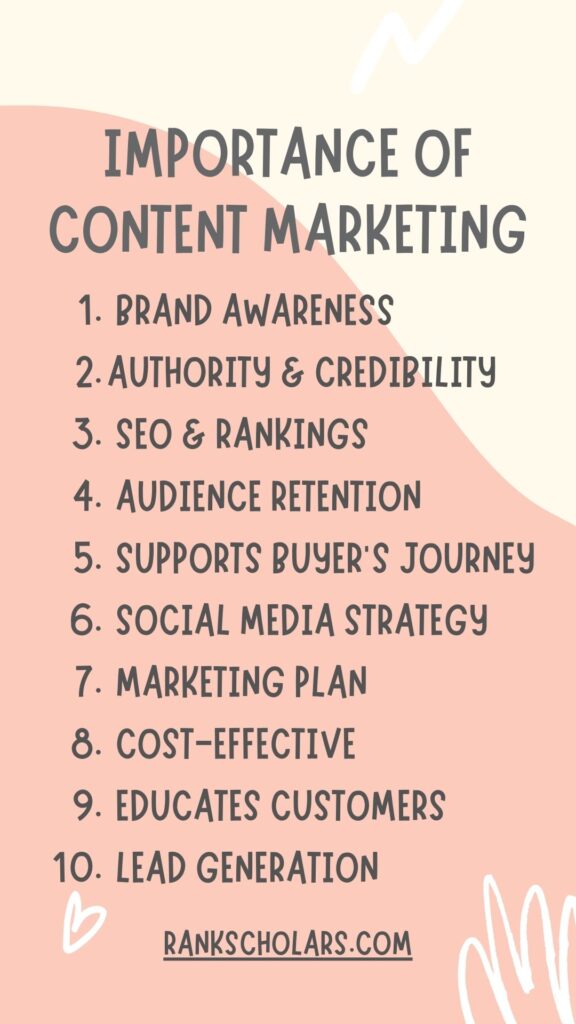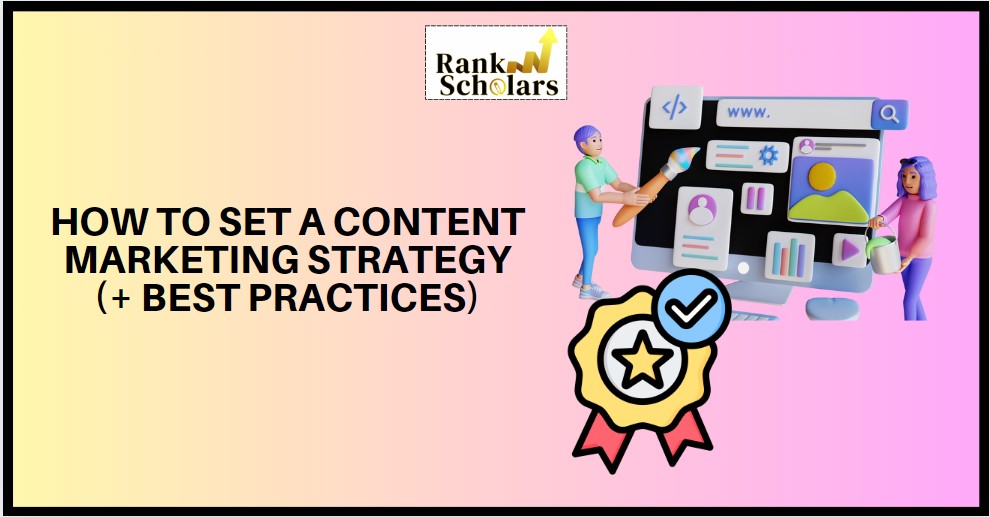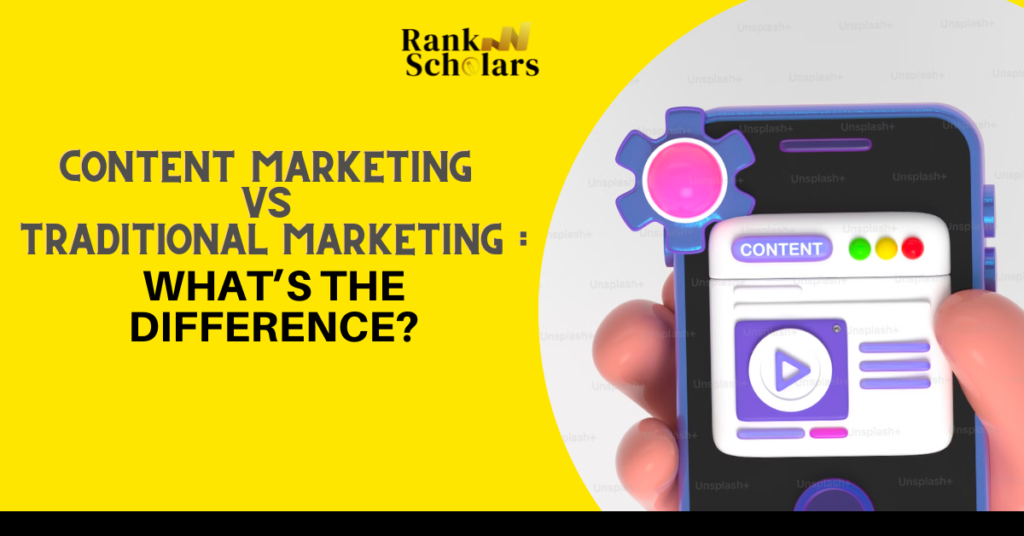Do you know that 90% of marketers include content in their marketing strategies? Why do you think that is? Content marketing is a practice that contributes significantly to generating consumer actions like increasing sales and generating leads.
It is one of the best possible ways to grow your business in a cost-effective way. This article will focus on why content marketing is important, why you need it, content marketing best practices and key steps to create a solid content strategy.
Let’s delve in!
Why Is Content Marketing Important?
Content Marketing is a strategic marketing approach that includes creating, publishing, and distributing valuable content to attract and engage a specific set of audiences. The final goal for content marketing campaigns is to generate consumer actions that are profitable for your company, such as generating leads, increasing sales, or enhancing brand loyalty.
But why is content marketing important for brands? Effective content marketing impacts various aspects of business growth and consumer engagement. Following are some of the main reasons why content marketing is important for a business.

Brand Awareness
Publishing high-quality content that ranks higher on SERPs increases your brand’s visibility online. Once people get across your content online that provides value to them, they become familiar with your brand. By consistently providing your target audience with relevant content, you can build recognition and trust among them and generate better leads.
Reaches The Right Audience
With effective content marketing strategies, your content shows up exactly when people search for keywords on the search engine and require your services or products. Reaching the audience that needs information and is looking for your product or services is much more effective in generating qualified leads that convert.
Authority And Credibility
Providing your target audience with insightful and reliable content can position you as an industry expert as the audience will perceive you as a knowledgeable and credible brand. With consistent publishing of relevant content that is helpful to your target audience and adds value to them, you can position your brand as an industry expert.
Betters SEO And Organic Search Rankings
Well-crafted content that is SEO optimized includes relevant keywords and adds genuine value to your target audience has a high chance of ranking better in Google Search Engine Ranking Pages. With search engine optimized and high-quality content, it is more likely that you can secure better backlinks and improve your site’s authority and ranking.
Engages And Retains Audience
By providing a valuable piece of content that addresses the pain points, needs, and interests of your target audience group directly, you can keep them engaged and coming back for more. Content that is regularly updated and relevant to your audience can help in retaining customers and generating more leads.
Nurtures Your Audience
According to a study it takes about 8 touchpoints to affect a sale. A user’s familiarity with your product makes or breaks their decision and hence having an effective and efficient marketing strategy becomes important. Unlike traditional marketing, content marketing guides your audience from the beginning and helps in converting them.
Supports The Buyer’s Journey
Informative content can help in spreading awareness about your products and services to your audience and converting your potential customers. Detailed educational content and tutorials will aid them in understanding the use cases of your products and services. And final content like case studies and testimonials can influence their final decisions.
Lead Generation And Conversion
Providing your target audience with informative and relevant content in the form of blog posts, ebooks, whitepapers, and webinars can attract potential leads in exchange for their contact details. Quality content on your website will nurture leads throughout the sales funnel and will increase the chances of leads getting converted.
Enhances Social Media Strategy
Engaging and effective content sparks conversations and interactions across various platforms. More so social media fosters a sense of community and belongingness to people. Engaging content that can be shared on social media is more likely to get shared on social media increasing your reach and increasing your reach.
Cost-Effective Marketing
Content Marketing is one of the most cost-effective ways of running marketing campaigns and can provide long-term results that prove to be better than those of traditional marketing methods. Unlike paid ads, the content remains on your website forever and continues to generate leads and drive conversions over time.
Relating Marketing Initiatives
Content that can be repurposed into various types and posted on different platforms can get you more reach and enhance your engagement. This would also enhance your overall marketing strategy and related goals. This in turn amplifies the other marketing efforts like email campaigns and paid advertising.
Educates And Informs Customers
Providing your audience with detailed and informative content can help educate your customers about your products, services, and their use cases. Content that is relevant and adds value to your audience will communicate the benefits of your services and help your target audience make informed choices.
Why Do We Need A Content Marketing Strategy?
Without a successful content marketing strategy, your content marketing efforts might feel futile or haphazard. A well-planned content marketing strategy will align your content goals with your business goals and streamline your content ideation, creation, and distribution processes.
A content strategy helps you identify and prioritize your market goals and allocate budgets and resources accordingly. A well-documented strategy allows you to have a plan that works accordingly and also has room for adjustments and flexibility.
Following are some of the reasons for making a proper content marketing strategy.
Clear Objectives
A successful content marketing strategy will provide you with a clear roadmap for your content marketing efforts while ensuring that every piece of content serves a specific purpose. It will also allow you to set measurable objectives and follow them, such as website traffic, generating leads, or boosting sales.
Understanding Your Audience
A successful content marketing strategy will help you create a clear roadmap of your goals and marketing efforts and ensure that every piece of your content serves its purpose. With a well-planned content strategy, you can understand your audience better and get your content to reach the audience that can convert and boost sales.
Consistency
Being consistent with your content and providing your audience with relevant and helpful content regularly will keep them engaged and attracted to your brand. A steady strategy will ensure that there is a steady stream of content flowing according to the schedule. It will also help in keeping a consistent tone and style throughout, establishing your brand identity.
Efficient Resource Allocation
An effective content marketing strategy will allow you to plan your content creation and publication process and in turn, help you in allocating your time and resources effectively. With proper resource allocation, it will be easier for you to prioritize tasks. This will also give you additional insight into budgeting and prioritizing the tasks with higher ROI.
Improved SEO And Online Visibility
A content marketing strategy will also include SEO considerations, keyword usage, and SERPs, ensuring that your content is optimized for the search engine and hence improves your online visibility. Improved online visibility will ensure that your content reaches the right audience and help you in distributing your content and maximizing reach while converting leads.
Enhanced Engagement And Interaction
A solid content marketing strategy will ensure that the content that you are providing your audience with, is relevant and useful to them. When your content is useful and visible to your audience when they need it, it also increases the chances of generating more leads and conversions. Increased engagement and interaction will help through the buyer’s journey, helping them in making decisions.
Performance Measurement And Optimization
Performance measurement and optimization of your content are necessary to make the most of your content while also being cost-effective. A proper content marketing strategy will allow you to measure your performance and identify the gap areas. By analyzing data and metrics of your content, you can refine your content strategy based on the information provided and get a better return on investment.
Content Longevity And Repurposing
Repurposing your content is one of the most common ways of providing your audience with content with minimal effort. A content strategy prepared well in advance would help you create timeless content that stays relevant for a longer period of time and drives continuous traffic and engagement. It also allows you to repurpose your content on different platforms.
Competitive Advantage
Consistently providing your audience with valuable content will position your brand as a thought leader in the industry. With a well-defined content strategy, you can stand out from your competitors by highlighting your USP and having a competitive edge in the industry. With a differentiating factor like content that makes your audience aware of your services, you are more likely to generate leads and have better conversion rates.
Content Marketing – Best Practices
Now, we’ll cover some content marketing best practices that will drive you better results and help you in maximizing your ROI.
1. Create A Clear Strategy
Create a clear strategy and establish what you want to achieve through your content strategy to streamline your content marketing process. Understand which is your target audience and their needs, preferences and pain points and how your content can address them.
2. Invest Time In Keyword Research
Keyword research is one of the most crucial aspects of content marketing strategy. It is important to understand what your audience is searching for online. Identifying high-volume and low-ranking keywords and including them in your content can better the chances of your content ranking well in search engines.
3. Establish Your Publishing Pace
Consistently publishing content will help you keep your audience engaged and also improve your SEO. Set a proper publishing schedule to provide your audience with quality content. It is better to publish high-quality less frequently than to publish low-quality content just to complete a monthly number.
4. Consider User Intent
User Intent is essentially what a searcher is trying to achieve with his query. It is important to ensure that your content matches the user intent behind the keywords that you are planning to target. Content that aligns directly with the user intent has a better chance of performing well amongst the readers and engaging the readers.
5. Optimize For SEO, But Don’t Overdo It
Optimizing your content for SEO means to include keywords naturally in your titles, headers, and throughout your content. Overloading your content with keywords may lead to unreadability and penalties from search engines. Also, make sure that your website is suitable for all device types and has a fast loading time.
6. Produce Different Types Of Content
Different audiences prefer different types of content. You can use a mix of blog posts, infographics, and social media updates to cater to your audience in the best way possible. You can also repurpose your existing content into different content types to cater to diverse audiences and drive a better engagement rate from existing audiences.
7. Use AI To Your Advantage
Utilizing AI to your advantage is a crucial practice that can save you loads of time. You can use AI to generate ideas, create outlines, optimize your content, or even maintain cohesion throughout. AI tools can help you in automating repetitive tasks like social media posts, sending emails, or updating content, allowing you to focus on strategizing.
8. Update And Refresh Older Content
Updating and refreshing your content is important to maintain its accuracy and relevancy. This increases your credibility and authority in the industry. By updating existing content with fresh data and updates, you can also improve your SERP rankings and drive better engagement and organic traffic on your website.
9. Create A Mix of Evergreen And Topical Content
Creating a blend of topical and evergreen content will ensure that you have a steady stream of traffic and engagement from the evergreen content and also help you benefit from timely interest in topical content. Topical content will generate you a quick stream of traffic whereas evergreen content will give you sustained traffic and engagement.
10. Leverage Thought Leaders In Your Industry With Licensed Content
Featuring content and interviews from your industry experts will position you as a credible and authoritative source of information. Thought leaders often have a dedicated following that can help you expand your reach and having licensed content on your website can add significant value to your audience.
11. Set Baselines And Track Results
Determine KPIs such as website traffic, engagement rate, and bounce rate, that align with your business objectives and measure your content’s effectiveness. With the data-driven insights, you can identify higher ROI areas and gap areas, which require more attention and improvement to generate higher returns on investment.
12. Measure Your Content For ROI
It is important to measure your content for ROI to refine your content strategy and focus on high-performing content areas that can get you better results. Calculate the cost of generating and distributing your content and the revenues generated from it. Use this data to prioritize areas that generate better ROI and are cost-effective.
13. Take Note Of Algorithm Updates
Keeping up with the algorithm updates of search engines is important as it significantly impacts your SEO. You can adjust your content strategy along the lines of an updated algorithm and rank your blog posts higher. Understanding these algorithms of your preferred platform can help you optimize your content for better reach and engagement.
14. Be Ready To Adapt When Needed
Making your content strategy adaptable is essential because the market, industry trends, and consumer preferences are constantly changing. Flexibility in your content strategy will allow you to adjust to their needs and preferences. You can develop a plan to adapt your content strategy to unforeseen events and maintain engagement with your audience.
Key Steps To Create A Content Marketing Strategy
If you are new to the world of content marketing and your efforts are not paying off the way you think, then the following are some steps for you to create a solid content marketing strategy that maximizes your return on investments.
Set A Goal
Establish clear and specific goals for your content marketing strategy to ensure that your strategy aligns with your business goals. These can include increasing brand awareness, generating leads, increasing engagement, or driving sales. Make sure that your goals are specific, measurable, achievable, relevant, and time-bound (SMART) and in cohesion with your business objectives.
Understand Your Audience
Understanding your audience is important in order to cater to them with their preferred choice of content. Create detailed buyer personas to represent your ideal customers and segment them into different groups on the basis of shared characteristics. Use tools, surveys, social media insights, and customer feedback to make data-driven decisions.
Choose Your Content Types
On the basis of buyer personas that you have created, choose content types that suit best to reach and engage your audience. Choose content types that align with your business objectives and satisfy the needs and preferences of your audience. Ensure that you mix a diverse set of content types so as to cater to a large set of audiences and their different choices.
Find Topic Ideas To Cover
Generate a list of ideas for potential blog topics considering your audience’s pain points and preferences. You can use keyword research tools to determine popular search terms and ensure that your content is discoverable and ranks higher on SERPs. Analyze your competitors’ websites to identify gap areas where you can provide valuable content and make additions to your topics.
Prioritize Topics With High Potential
While choosing a topic, make sure that the topic is highly relevant to your audience and aligns with your content marketing goals. Also, try to prioritize topics that may have the potential to generate higher engagement such as with current issues and trends. Selecting topics with high SEO value is important to improve your SEO requirements and rank better in SERPs.
Create a Content Calendar
Maintaining a constant presence and keeping your audience engaged is important to drive better leads. For this purpose, create an editorial calendar and schedule regular updates in the content calendar with an outline of what content is created, by whom, the time of posting, and the person responsible for each task. Keep the calendar flexible enough to include current issues and trending topics to post about, so that your content stays up-to-date.
Promote Your Content
Do not shy away from promoting your content across various platforms. Use multiple channels and platforms to promote your content and drive the best possible engagement rates. Share your content across social media, LinkedIn, blog previews via email newsletters, and other platforms that suit your preferences. You can also consider paid advertising on social media in the form of sponsored posts or social media ads.
Monitor Your Performance
Based on your organizational goals, establish key performance indicators like website traffic, leads generated, and engagement rates. Use analytics tools and track your conversion rates, ROI, and page views among other KPIs.
Identify what content is working for you and what is not. Use these data and insights to make data-driven decisions to refine your strategy and make informed decisions to maximize ROI.
Start Creating Your Content Marketing Strategy Now!
After setting up your goals, understanding your audience’s needs and preferences, and choosing your content types and promotional channels, it is time to create your content marketing strategy now.
By following these steps in order, you’ll be able to create a solid content marketing strategy that effectively reaches and engages your audience consistently, supports your business goals and objectives, drives results, and maximizes ROI or you can take the easy way out with the help of Rank Scholars and get a personalized content marketing strategy that drives you effective results.
Final Words
Now that you have learned how to create a content marketing strategy and best practices to drive maximum results, start executing them. Take the help of these content marketing best practices and put these steps into practice to start creating your strategy.
All the best!

Anubhuti is a freelance writer who crafts engaging content. Running on a single cup of coffee, on most days, she prefers books and music over people and loves creating compelling content for you!













